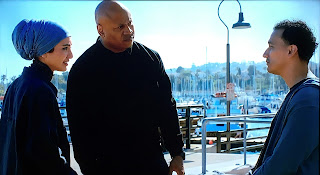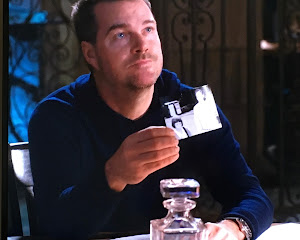"Live Free or Die Standing" (Season 13, Episode 19)
It's always nice to see familiar faces, and it's been too long since we last saw Talia de Campo. This episode was a true team effort, written by Eric Christian Olsen and ably directed by his partner in crime solving, Daniela Ruah. Besides bringing back Talia, the story also had a connection to the Navy and tackled an issue with international and national repercussions. But, while the other elements of the episode delivered the quality viewers have come to expect from the cast and crew, the writing--once again--did not. Writing is arguably one of the most difficult things to do well, and although this episode was an admirable effort, there were too many unanswered questions about things that happened, or didn't happen, to consider it one of the best episodes of any season. No episode is "good" simply because of who writes it no matter how sincere their effort. Which isn't to say that the episode didn't have some very good scenes. It did. The story, however, didn't hold together.
The opening scene was one of the good scenes and definitely dramatic: we hear voices and guns firing, but the screen is totally dark until we see two men from behind running up stairs and then a door opens and bright sunlight shows the two men sprint onto the roof of a building. They are being hunted. One man closes the door to the rooftop entrance and tells the other man to get away. We then see the other man descending the fire escape while we hear more gunshots on the roof. When the man escaping reaches the street, he stops and is removing (maybe) an SD card from his phone when the headless body of the other man lands on the sidewalk beside him. As I said, dramatic, but once we know who the men are, the scene begins to not make much sense. As we find out from Talia a few scenes later, the man escaping (Martin) is a whistleblower and the man trying to help him escape was a DEA agent (which explains Talia's involvement). According to Talia, the Mexican government is bringing suit against U.S. gun manufacturers for targeting cartel members in their marketing campaigns, and Martin is their most important witness, a whistleblower who has evidence that gun manufacturers are, in fact, designing marketing campaigns to appeal to the cartel. So, this one, all-important whistleblower will be testifying on behalf of a foreign government in a closed-door congressional committee hearing and ONE DEA agent is taking him to D.C.? I'm guessing Martin's based in L.A. and was on his way to D.C. because there would be no point in bringing Martin to L.A. for a congressional hearing. But if Martin was "picked up" in L.A. by the DEA agent, why was there only one and why weren't other federal law enforcement agencies involved? The FBI, Homeland, and US Marshals all have field offices in L.A. And where was the contingency plan if they ran into trouble? After all, this lawsuit might limit the guns available to the cartels, so they'll probably try to stop Martin. And once Martin and the DEA agent ended up on the roof, the only directive the agent gave Martin was not to talk to anyone. In other words, the agent knew no one in DEA or any other agency he could trust. So, once the agent's dead, Martin's on his own. That's not a good contingency plan. And Martin decides to stay in L.A.? Why not follow Hetty's example and get out of Dodge? Also, as a Navy vet, Martin knew about NCIS, but he felt he couldn't trust them?
Once the search for Martin begins, Sam and Rountree head to a restaurant where Martin's boss, Carlisle, is currently dining (How did Talia know that's where he'd be?), and Kensi and Deeks are off to Lancaster. The address in Lancaster is Martin's last text before going offline (If he didn't text Talia, how did she get the information, and if he texted Talia, why didn't Martin tell her where he was going or ask for help?) All Fatima can tell them from Ops is that it's a ranch house being remodeled. At the restaurant Sam and Rountree approach Carlisle's table and are accosted by two men they dispatch of easily, and Carlisle leaves with them without a fuss.
Kensi and Deeks arrive at the ranch house and enter to find it empty. Almost immediately, they get a call from Fatima who's watching a video of them arriving. How "threat management" would have identified or even seen this video is a guess. Kensi and Deeks expect visitors, but when they exit the house, they find that all the "neighbors" have disappeared. (The "neighbors" were there to watch the house, but if the cartel isn't afraid of beheading a DEA agent in downtown L.A., why would they be afraid of killing two federal agents at a remote house?)
Back at the boatshed, Sam and Rountree question Carlisle who insists that his company has done nothing illegal and that maybe Martin is missing because of the stress of being a witness for the Mexican government. He tells Sam and Rountree that if the cartel is already watching him, they're way ahead of NCIS. It makes sense the cartel is watching Carlisle because Carlisle is Martin's boss, and they know Martin's the whistleblower. (And since the cartel knows Martin's the whistleblower, there's a possible leak among those involved, but that's not even mentioned by Talia as a potential problem.)
While Kensi and Deeks continue their search for Martin, Kilbride joins Sam and Rountree at the boatshed where they have interviewed Carlisle unsuccessfully. I didn't understand this line of questioning. How would Carlisle know where Martin was? Would Martin go to a place his boss--who's working with the cartel--would know? Same with Miguel Flores. Why would Miguel know where Martin is? If Martin's based in L.A., there are hundreds of places to disappear. How do they even know Martin's still in the area? Anyway, once Kilbride gets Miguel's name, Sam and Fatima head to the marina, but though Miguel has no physical address on file, Kensi and Deeks, still at the ranch house being remodeled, find his Raptor in the garage and a dead body in the attic. This brings the bomb squad and after their inspection, the house is declared free of bombs, but behind every sheet of drywall the agents find guns of every type and size.
When Talia arrives in L.A., she meets up with Rountree at a retirement home where multiple residents have purchased over a hundred guns in the past six months. (More than a few residents had to be involved because, by law, a person can only purchase one gun per month in California.) Their repartee is funny, but the scene didn't make sense. It turns out the receptionist is the actual straw buyer for the cartel, but she's murdered by a cartel assassin while Talia and Rountree are interviewing a resident. Is she the only straw buyer in L.A. who works with Carlisle? Is that how the cartel knew Talia and Rountree would be going to the retirement home?
Martin is still missing and at the marina Sam and Fatima have found and detained Miguel who refuses to help them for fear that his family living in Mexico will be harmed. Kilbride goes back in to see if he can't get information from Carlisle whose lawyer has joined him. During their back-and-forth, Carlisle finally tells Kilbride that the woman isn't "his" lawyer; she was sent by those above him. At this point, I wondered why Kilbride didn't immediately send the woman out of the room. Carlisle just told him she wasn't his lawyer, and the people "above him" refers to the cartel. Did Kilbride think the lawyer would let Carlisle possibly give Kilbride the names of every straw buyer, gun smuggler, and cartel contact? Of course she wouldn't. Kilbride seemed a little slow on the uptake here. Instead of continuing to demand to know where Martin was and ignoring the threat to Carlisle, how about getting Carlisle away from the cartel's lawyer? It seemed unlikely Kilbride wouldn't know what a woman's capable of since he's dealing with Katya. Anyway, Kilbride doesn't do anything to protect Carlisle, and he's killed by the lawyer.
Back at the marina, Sam appeals to Miguel to provide them with information about where Martin is. It's a passionate speech, well-delivered, and after hesitating, Miguel decides to help and checks his phone, but he tells Sam the cartel's found Martin. How? How does he know that? Is the cartel sending out a mass text that they've found the man they're going to kill? Is that how he knows Martin is at a warehouse in Culver? Or is Miguel somehow tracking Martin's phone, and if he is, couldn't NCIS or DEA do the same? Did they even try? Did they ever try to call Martin? They have his phone number.
Anyway, after the agents are told where Martin is, there's a mad rush by Sam, Fatima, Rountree, and Talia to the warehouse to try and save Martin. And what they find didn't make sense: the cartel kills and beheads a DEA agent in downtown L.A., but at the abandoned warehouse they shoot Martin in the abdomen giving him a slim chance of survival? Why not shoot him in the head or cut off his head? That just seemed sloppy of them. Sam grabs Martin and hauls him out of the burning building while Talia shoots and kills the female cartel assassin. (I did find it odd that the assassin is the one who chooses to "die standing.")
Outside, Sam rides with Martin in the ambulance while Rountree takes Martin's phone from his pocket and notices that he was filming (that the cartel left Martin's phone with him is just more sloppiness). Rountree wonders what to do with it, and Fatima tells him to send it in. The next scene is Kilbride speaking with someone (maybe Sec Nav) about the video Martin recorded, and evidently, is told to just hold onto the video; it's not admissible in court and is not to be disseminated. During the call, Killbride hears from Sam that Martin died in the ambulance. He stalks out of his office and then the agents receive Martin's video from a blocked number. It's clear that Kilbride has uploaded the video, but it's unlikely he'll suffer any consequence for disobeying a direct order (that seems to be the case for several team members). This act of defiance gives Kilbride a final stand as the moral authority at the top of the stairs.
Again, the episode had a strong core idea, but the execution just wasn't there; however, Olsen is to be applauded for taking on the daunting task of writing an episode. Hope he continues to hone his craft.



Comments
Post a Comment